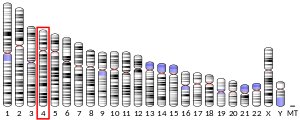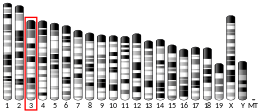MGST2
Microsomal glutathione S-transferase 2 is an enzyme that in humans is encoded by the MGST2 gene.[5][6]
The MAPEG (Membrane-Associated Proteins in Eicosanoid and Glutathione metabolism) family consists of six human proteins, several of which are involved in the production of leukotrienes and prostaglandin E, important mediators of inflammation. This gene encodes a protein that catalyzes the conjugation of leukotriene A4 and reduced glutathione to produce leukotriene C4.[6]
References
- GRCh38: Ensembl release 89: ENSG00000085871 - Ensembl, May 2017
- GRCm38: Ensembl release 89: ENSMUSG00000074604 - Ensembl, May 2017
- "Human PubMed Reference:". National Center for Biotechnology Information, U.S. National Library of Medicine.
- "Mouse PubMed Reference:". National Center for Biotechnology Information, U.S. National Library of Medicine.
- Jakobsson PJ, Mancini JA, Ford-Hutchinson AW (Oct 1996). "Identification and characterization of a novel human microsomal glutathione S-transferase with leukotriene C4 synthase activity and significant sequence identity to 5-lipoxygenase-activating protein and leukotriene C4 synthase". J Biol Chem. 271 (36): 22203–10. doi:10.1074/jbc.271.36.22203. PMID 8703034.
- "Entrez Gene: MGST2 microsomal glutathione S-transferase 2".
Further reading
- Jakobsson PJ, Morgenstern R, Mancini J, et al. (2000). "Membrane-associated proteins in eicosanoid and glutathione metabolism (MAPEG). A widespread protein superfamily". Am. J. Respir. Crit. Care Med. 161 (2 Pt 2): S20–4. doi:10.1164/ajrccm.161.supplement_1.ltta-5. PMID 10673221.
- Hillier LD, Lennon G, Becker M, et al. (1997). "Generation and analysis of 280,000 human expressed sequence tags". Genome Res. 6 (9): 807–28. doi:10.1101/gr.6.9.807. PMID 8889549.
- Jakobsson PJ, Mancini JA, Riendeau D, Ford-Hutchinson AW (1997). "Identification and characterization of a novel microsomal enzyme with glutathione-dependent transferase and peroxidase activities". J. Biol. Chem. 272 (36): 22934–9. doi:10.1074/jbc.272.36.22934. PMID 9278457.
- Jakobsson PJ, Scoggan KA, Yergey J, et al. (1998). "Characterization of microsomal GST-II by western blot and identification of a novel LTC4 isomer". Journal of Lipid Mediators and Cell Signalling. 17 (1): 15–9. doi:10.1016/S0929-7855(97)00013-8. PMID 9302651.
- Sjöström M, Jakobsson PJ, Heimburger M, et al. (2001). "Human umbilical vein endothelial cells generate leukotriene C4 via microsomal glutathione S-transferase type 2 and express the CysLT(1) receptor". Eur. J. Biochem. 268 (9): 2578–86. doi:10.1046/j.1432-1327.2001.02142.x. PMID 11322876.
- Strausberg RL, Feingold EA, Grouse LH, et al. (2003). "Generation and initial analysis of more than 15,000 full-length human and mouse cDNA sequences". Proc. Natl. Acad. Sci. U.S.A. 99 (26): 16899–903. doi:10.1073/pnas.242603899. PMC 139241. PMID 12477932.
- Gerhard DS, Wagner L, Feingold EA, et al. (2004). "The status, quality, and expansion of the NIH full-length cDNA project: the Mammalian Gene Collection (MGC)". Genome Res. 14 (10B): 2121–7. doi:10.1101/gr.2596504. PMC 528928. PMID 15489334.
- Yang S, Yan KL, Zhang XJ, et al. (2006). "Systematic evaluation of association between the microsomal glutathione S-transferase 2 common variation and psoriasis vulgaris in Chinese population". Arch. Dermatol. Res. 298 (3): 107–12. doi:10.1007/s00403-006-0670-4. PMID 16773312.
This article is issued from Wikipedia. The text is licensed under Creative Commons - Attribution - Sharealike. Additional terms may apply for the media files.



